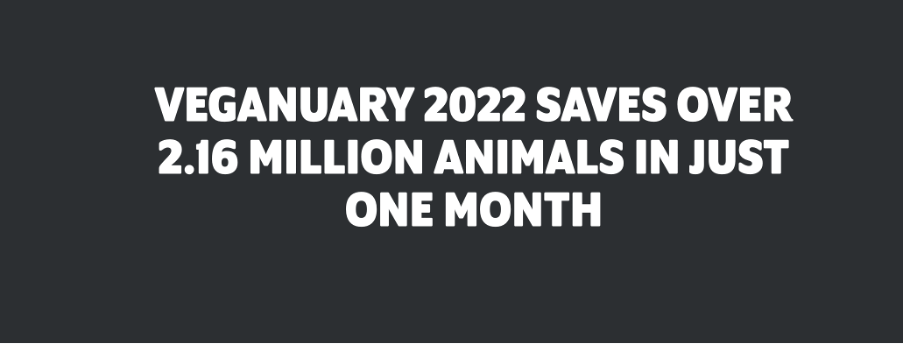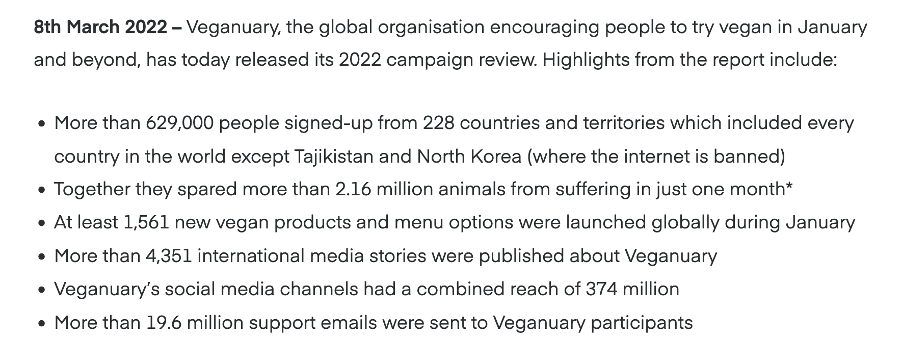
The Problem with Veganuary
As January approaches, so does the debate within the animal liberation movement about whether individuals, groups or organisations should support the Veganuary campaign. Opinions within the animal liberation movement are divided; some see Veganuary as an important strategic tool for building a better world for non-human animals. Others see it as nothing more than a capitalist publicity stunt with no impact whatsoever. Who’s right?
Veganuary – what is it all about?
Veganuary is a campaign designed to encourage people to adopt a fully plant-based diet for the month of January and, if possible, for the rest of the year. Veganuary’s long-term vision is a “vegan world” without “animal farms and slaughterhouses”1. To make Veganuary more attractive to consumers, the campaign has formed a number of partnerships with retailers and product manufacturers. Supermarkets are offering vegan products at lower prices or expanding their selection in January, restaurants and canteens are preparing more vegan dishes, etc.
The good news first: Veganuary is getting more people involved with the vegan cuisine
The idea of Veganuary doesn’t sound bad at first. Many people shy away from a vegan diet because it is associated (at first) with extra effort and sacrifice. Veganuary’s extensive marketing campaign raises awareness of veganism and promotes plant-based products. This gives people the opportunity to explore different meat or dairy substitutes and realise the availability of affordable vegan products that could be adopted as a sustainable long-term choice.
This seems to be the reason why many animal rights organisations officially support Veganuary. In line with the market economy principle of “demand creates supply”, these organisations expect Veganuary to lead to an increase in the number of vegans. As a result, they believe that this increase in veganism will lead to a change in market dynamics, specifically a reduction in the demand – and therefore supply – of animal flesh, dairy and eggs.
Supply and demand: Does Veganuary save non-human animal lives?
The last statement raises two questions that are relevant for animal rights activists: Does Veganuary really produce more vegans in the long run? There is no reliable evidence on this (yet). Does Veganuary change demand, at least in January? Veganuary gives a somewhat indirect answer to the second question. The website states that an animal product-free January “spares” many animal lives, which would also imply that the demand for meat decreases at that time. See for example2:


Under the second bullet point, Veganuary writes that more than 2.16 million animals worldwide have been “spared from suffering” thanks to its many participants. Veganuary gets this data from the Veganalyser calculator. Using information such as age and diet, the calculator visualises how many animals would be saved by not eating meat.
However, being aware of how much meat one has not eaten is not the same as actually “sparing” animals. Rather, a plant-based diet means avoiding certain foods so as not to be part of an industry that exploits morally significant beings. At best, one could argue that fewer animals will be bred, farmed and slaughtered if a personal rejection of animal products leads to a reduction in demand. But this is not the case with Veganuary. Studies show that the increase in demand for plant-based products in January does not correlate with a decrease in demand for meat3. In fact, meat consumption does not decrease in general over the year. In Switzerland, it stagnates or even increases slightly again4. In other words: Veganuary does not affect meat sales – they remain stable. The same goes for other animal products. Demand for eggs (which should also be avoided during Veganuary) was even found to be surprisingly high in Switzerland in January 20245.
These observations are, of course, no excuse for rejecting a vegan diet. Veganism is a matter of justice, and the least we can do to acknowledge non-human animals as moral subjects is to not consume them and thus not participate in their exploitation. Criticism of Veganuary is directed at their misleading figures. They are based on a calculator that projects a hypothetical scenario of how many animals would theoretically not be killed if a person adopted a plant-based lifestyle. However, this does not reflect real market conditions, nor does it actually lead to animals being “spared”.
Veganuary may lead to more flexitarians, but its impact on improving animal welfare is questionable
Veganuary presents veganism as a way of life that you can “try out”, that you can get into but also can opt out of at any time. The focus is not on non-human animals, but on the consumer. Vegan diets are lumped together with diets such as low-carb, high-protein, keto (or whatever they are called) and sometimes marketed as a health trend. It is unfortunate that veganism, which is already riddled with prejudices, is thus portrayed even more as a subjective lifestyle that is ultimately about consumption. This reduces an entire philosophical and political tradition of thought, namely that of anti-speciesism, to a dietary choice.
The essence of veganism (or anti-speciesism) lies in the recognition that species membership is an arbitrary criterion for hierarchising two living beings, and that oppressing someone on the basis of their species is therefore irrational. Put simply, avoiding the exploitation of non-human animals is a fundamental principle of justice, like opposing sexism or racism. It’s not a trend or a lifestyle choice to be abandoned when it becomes inconvenient. Veganuary, however, doesn’t seem to embrace this underlying principle, treating the decision to go vegan as if it were a morally neutral and optional choice.
Veganuary is a symptom of a wider phenomenon, namely that of “mainstream veganism”. Mainstream veganism is a politically neutral and consumer-based form of veganism. It represents the “vote with your dollar”-approach and, to put it somewhat simply, believes that a vegan world can be achieved if a critical mass of people switch to vegan diets. There are many reasons to reject this interpretation of veganism, or at least to see it as incomplete.
Firstly, this approach completely ignores the “complicity” of our current neoliberal economic system in the commodification of non-human animals. Intensive animal farming (e.g. factory farming) is a symptom of an economic system that aims to produce meat, eggs and milk on a massive scale as efficiently as possible for profit, whilst always subordinating the interests of animals to those of consumers and producers. This is demonstrated by the fact that, over time, animals have been genetically manipulated to produce more milk, lay more eggs or grow faster (of course, always at the expense of animal welfare).
A consumerist approach ignores this problem. Participating companies of Veganuary, for example, have no interest in animal welfare if it does not make economic sense for them – Micarna, Bell and Suisseporcs have already proven this sufficiently. Moreover, these companies would not welcome it if Veganuary were to actually harm meat sales. Despite Veganuary, all major retailers in Switzerland, including Coop, Migros and Lidl, published meat advertisements and offered discounts on meat in January6. Consumer psychologist Christina Tobler explains this apparent contradiction:
“Retailers are not just promoting Veganuary out of idealism, they want to sell their products. It is common for large retailers to want to attract all their customers – even those who do not participate in Veganuary”6.
Given the market power the companies that exploit animals have, as well as the huge farming and meat lobbies that play a key role in shaping policy, a consumerist approach seems analytically under-complex. To truly make progress in protecting non-human animals (or prevent their suffering), it is not enough to simply avoid certain products; what is needed, above all, is political commitment and opposition directed at those interest groups that profit most from animal exploitation. There is an urgent need for politicians and activists to challenge (or at least stand up to) the farmer/meat lobby. Or push for initiatives to ensure that vegan substitutes are also subsidised by the state (because people will not buy vegan products if they remain almost unaffordable). We need more people to campaign for animal rights and protection laws (this seems even more pressing now that our right-wing Federal Council has ignored the Swiss people’s vote against the revision of the Hunting Act and is still ordering the mass culling of wolves).
A second related problem is that mainstream veganism, and therefore Veganuary, focuses solely on food. However, the oppression of non-human animals is not limited to so-called “farm animals”, but is present and problematic in many other areas of our lives: when we use them for testing medication or aesthetic products or for entertainment (as in the case of “pets” and animals imprisoned in zoos), or when we destroy the habitats of wild living animals (this in particular could not be solved by a consumerist account since unregulated vegan capitalism would still be disastrous for the environment – furthermore, vegan products are not automatically “ethical” as their production can be linked to human rights abuses and horrible working condition). This is precisely why it is problematic to equate veganism with a form of diet. Anti-speciesism is a comprehensive theory of justice that calls us to critically discuss our treatment of and duties towards all kinds of morally relevant beings (yes, including other humans).
To answer the initial question of what Veganuary does for animal liberation, I would answer with: not much. The likelihood of Veganuary persuading people to speak up and take action for animals seems low – especially if they are also made to believe that they are already saving animals by giving up meat or dairy products once or twice a week. Veganuary does encourage more people to try vegan products and lowers the prices of (far too expensive) substitutes for a month; and this is a good thing. But beyond that, Veganuary’s impact on animal liberation seems negligible. It may even be counterproductive, further degrading veganism, whose rational and philosophical underpinnings are largely unknown or not taken seriously anyway, to a subjective and amoral lifestyle choice.
Footnotes
-
Veganuary. (2023, December 27). Veganuary 2024. https://veganuary.com ↩
-
Veganuary. (2023, August 2). Veganuary 2022 saves over 2.16 million animals in just one month. Veganuary. https://veganuary.com/veganuary-2022-saves-over-two-million-animals/ ↩
-
see for example: https://pubmed.ncbi.nlm.nih.gov/36073024/ https://www.foodnavigator.com/Article/2022/10/10/veganuary-boosts-plant-based-but-doesn-t-take-a-bite-out-of-meat-sales ↩
-
Bundesamt für Statistik. (2023, January 5). Entwicklung des Nahrungsmittelverbrauches in der Schweiz. Je Kopf und Jahr - 1980-2021. Bundesamt Für Statistik. https://www.bfs.admin.ch/bfs/de/home/statistiken/land-forstwirtschaft/ernaehrung.assetdetail.23945845.html ↩
-
Unerwartet grosse Nachfrage - Gesteigerter Appetit: In der Schweiz droht Eiermangel. (2024, January 18). Schweizer Radio Und Fernsehen (SRF). https://www.srf.ch/news/schweiz/unerwartet-grosse-nachfrage-gesteigerter-appetit-in-der-schweiz-droht-eiermangel ↩
-
Lüthy, B. (2023, January 14). Veganuary-Aktionen: Nur ein Detailhändler verzichtete kurz auf Fleischwerbung. Tages-Anzeiger. https://www.tagesanzeiger.ch/veganuary-aktionen-zielen-gar-nicht-auf-veganer-757161479600 ↩ ↩2